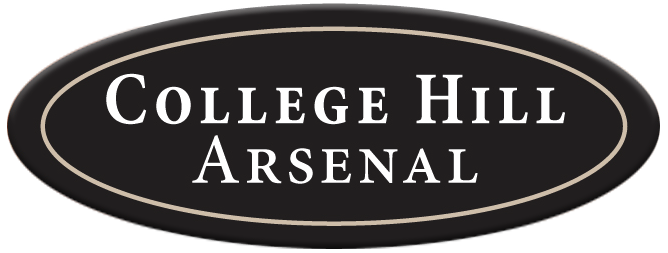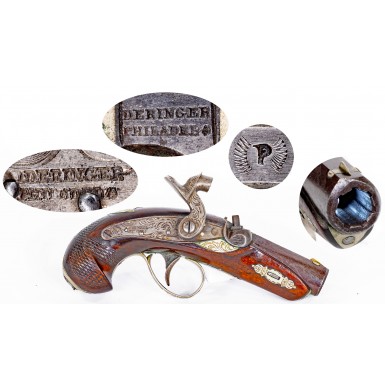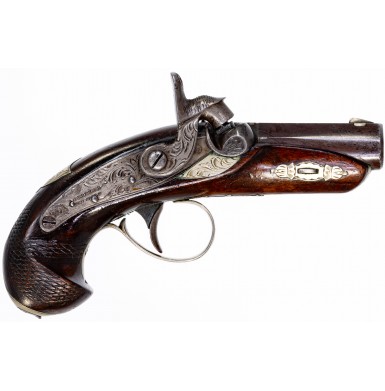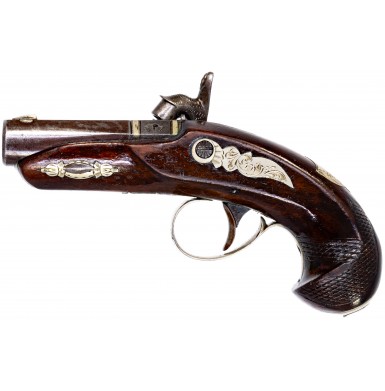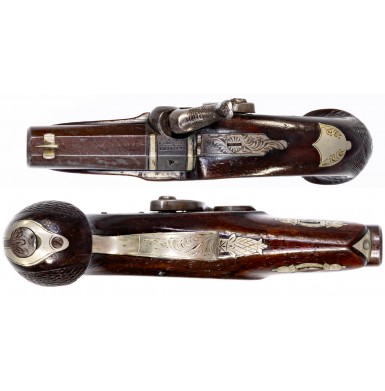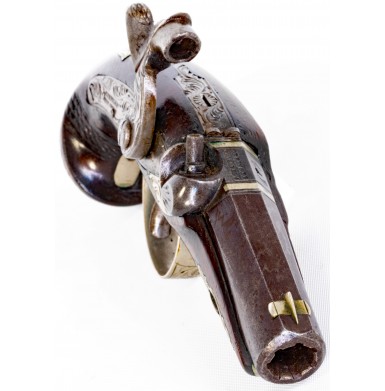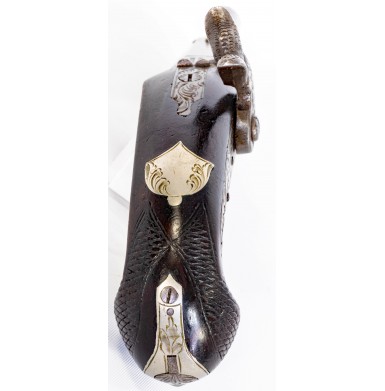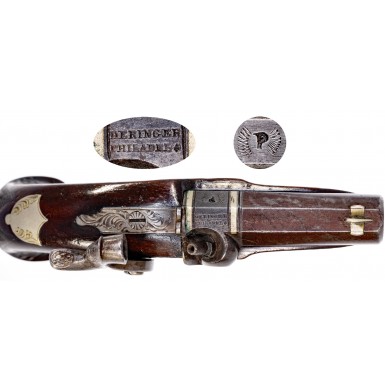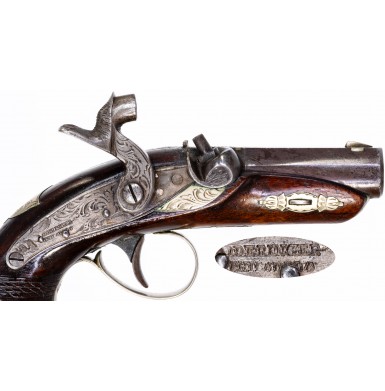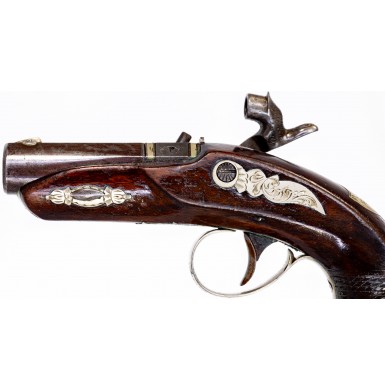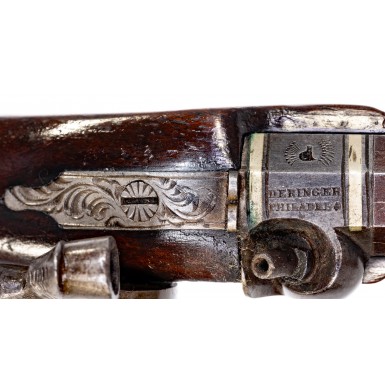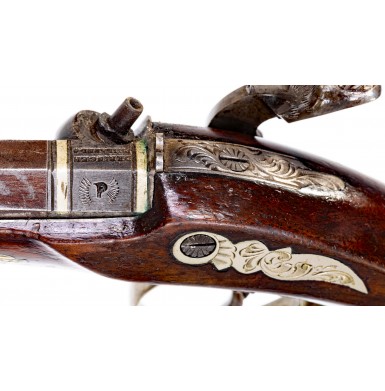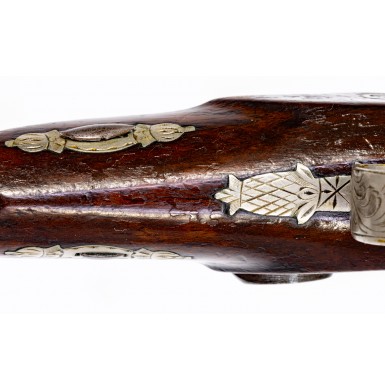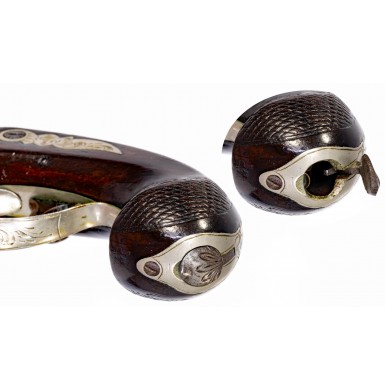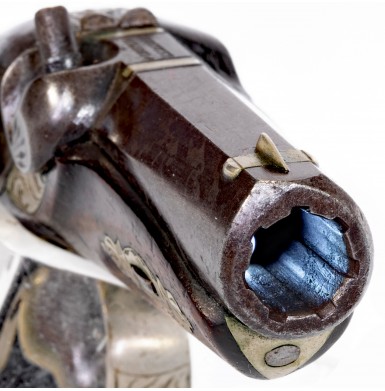Very Fine Henry Deringer Small Pocket Pistol
- Product Code: FHG-3544
- Availability: Out Of Stock
-
$2,495.00
There are probably no other single shot percussion pistols that are more famous than those produced by Philadelphia gun maker Henry Deringer. In fact, Deringer was so successful in creating the archetype of the eminently concealable percussion pocket pistol that his name became a generic term for any small, large caliber hideout pistol and is still used today with that meaning. Among most firearms authors and historians, when speaking of guns actually made by Deringer, the gun’s name is spelled as the maker’s name is. However, when the term is used generically, it is typically written with a lower case “D” and two “R’s” in the word. Deringer’s name is also forever tied with one of the most heinous crimes committed in the United States, the assassination of President Abraham Lincoln. It was a Deringer pistol that was used by assassin John Wilkes Booth to commit the murder and to this day, collectors often refer to the Deringer pistols that are the same size as the one used by Booth as “Lincoln Deringers”.
While we know that Henry Deringer produced his pocket pistols from the late-1830s through 1868, it is about impossible to tell exactly when a particular gun was made since they are not serial numbered. However, through scholarly research, we can come up with a range of production dates based upon various features. The most useful of which are the German silver triggerguard finial decorations, which have been classified into specific date ranges. Deringer pistols were sold across the United States and its various territories during the mid-19th century and often bore the “Agent Mark” of the dealer who was selling the gun. Today, these agent marks are particularly important in valuing Deringer pistols, as the marks often suggest where the gun may have been used, in the Gold Fields of California, in the antebellum South, or in the streets and alleys of Northern cities. Deringer’s is noted to have said that he produced 1,280 pairs of his pistols between 1861 and 1866 and 5,280 pairs between 1856 and 1866. As such it is surmised that he probably manufactured about 15,000 pistols (7,500 pairs) during the entire period of their production.
The Henry Deringer Small Pocket Pistol offered here was likely manufactured between about 1850 and 1870, based upon the type of finial on the gun. However, the presence of the cap box in the butt suggests it was more likely produced closer to 1850 than to 1870. The pistol has a 2.5” barrel with a nominally .41 caliber bore that is rifled with seven narrow grooves. The pistol measures about 5.5” in overall length. Like most Deringer pistols of this size, it is not fitted for a ramrod. A single wedge key and the breech plug screw retain the barrel. The lock plate, hammer, triggerguard bow and breech plug tang are all lightly engraved with tight foliate scrolls. The backaction percussion lock is marked in two lines DERINGER/PHILADELA with the top flat of the barrel marked in the same manner. A “Starburst”-P proof is present on the left angled flat of the breech. is rifled with seven narrow grooves.
The pistol remains in VERY FINE condition. The color casehardened lock and hammer have a smoky, somewhat mottled gray patina with some minute traces of color present where the hammer neck has protected the lockplate, behind the bolster. The lock remains in fine mechanical condition and functions crisply on all positions. The iron barrel retains about 80%+ of the original brown finish, although none of the faux Damascus patterning from the copper streaking remains visible. There are, however, some trace wavy lines that are probably where the copper was originally applied. The barrel is almost entirely smooth with no pitting present and only some scattered light to moderate surface oxidation which is mostly confined to the bolster area and the face of the muzzle. The bore is in about FINE condition as well. It is dark and shows some oxidation but retains excellent, crisp rifling. The breech plug tang is mounted with a small, notched rear sight with a small German silver blade at the end of the barrel serving as the front sight. As is typical of Deringer pistols, the gun is adorned with German silver mountings and inlays. There is a plain heart-shaped German silver escutcheon inlaid on the backstrap of the gun that could have been engraved with the owner’s initials but has been left blank. Other mountings include a German silver sideplate, cap box surround, nosecap, wedge escutcheons and triggerguard. All of the mountings are lightly engraved and are quite attractive. German silver bands are also present at the breech. The gun features Deringer’s signature checkered bird’s head butt profile. The walnut stock is in about FINE condition, with much of the original finish present. The loss is from handling and wear, but much of the varnish is still present. The wood is quite crisp, although it shows the normal handling bumps and dings, and the checkered grip shows the expected light wear and minor smoothing. The stock is full-length, solid, and free of any breaks or repairs. The wood to metal fit is excellent throughout the pistol.
Overall, this is an extremely nice, very crisp and very well marked example of a Henry Deringer Small Percussion Pocket Pistol. No collection of Civil War period arms is complete without a Deringer pistol by Henry Deringer. Many a young lad went off to war on both sides carrying one of these guns. Also, many of the prospectors struck with “gold fever” in 1849 placed one of these guns in their pocket as they headed to California or purchased one from a Deringer agent once they arrived. As noted, it was a Deringer pistol in the hands of John Wilkes Booth that ended the life of Abraham Lincoln as well. It is rare to find a weapon that is so universally recognized by the non-gun collecting world, so well-known and is such an iconic part of firearms history that the maker’s name has become the generic term for all small sized pocket pistols. A Deringer is an essential part of any antique arms collection and this one being one of the smaller models and retaining so much finish would be a particularly good piece to add to any collection of Civil War era handguns.
